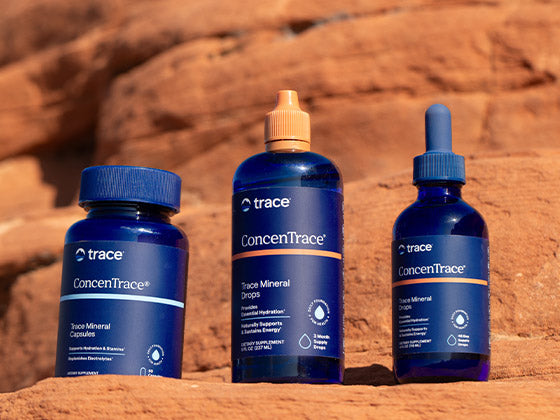At Trace Minerals, we set the standard for mineral supplementation. Trusted for over 50 years, our formulas are grounded in science and powered by nature. We source pure, potent, and precisely balanced ionic trace minerals directly from the Great Salt Lake to fuel your active life. Whether recovering from a workout or maintaining whole-body health, we deliver what your body needs to perform at its peak daily.
Dehydration and fatigue can hit hard after intense activity, but recovery isn't just about water. Learning how to replenish electrolytes effectively can change how you feel, move, and recover. Each mineral, from sodium to magnesium, plays a role in maintaining fluid balance and muscle performance. But timing, absorption, and food choices all matter, too. If you’re navigating post-workout recovery, heat exposure, or daily exertion, understanding how to restore lost electrolytes is the key to staying balanced and energized.
In this blog, we will explore the essential roles electrolytes play in your body, what causes imbalances, and the most effective strategies for restoring and maintaining proper electrolyte levels through diet, hydration, and supplementation.
Key Takeaways:
- Why Electrolyte Balance Matters: Electrolyte balance is essential for hydration, energy, nerve signaling, and muscle function, and is often disrupted by modern diets and environmental factors.
- Spotting the Signs of Deficiency: Recognizing signs of electrolyte deficiency, such as fatigue, muscle cramps, and dizziness, is crucial for maintaining health, especially for those engaging in physical activities or experiencing illness.
- Effective Ways to Restore Balance: Natural food sources, intentional hydration, and supplementation play key roles in restoring electrolyte balance, supporting long-term well-being, and resilience against daily stressors and health challenges.
Electrolytes And Long-Term Health Benefits
Maintaining a healthy balance of electrolytes is more than an immediate response to dehydration. These sodium, potassium, calcium, and magnesium minerals are central to your body’s critical functions. They regulate nerve transmission, support steady muscle contraction and relaxation, maintain blood pressure within a healthy range, and enable proper hydration at the cellular level.
Preventing Chronic Deficiencies Through Consistency
Ongoing imbalances in electrolyte intake can lead to deeper health issues over time. A lack of magnesium has been linked to muscle cramps, poor sleep quality, and persistent fatigue. Chronic potassium deficiency can elevate blood pressure and strain cardiovascular health. Long-term electrolyte support can contribute to stronger bones, improved circulation, and more efficient metabolic activity, all necessary for sustaining energy and performance as you age.
The Modern Nutrient Gap And Its Implications
Today’s food systems often produce crops with lower mineral content due to depleted soils and heavy processing. These factors make it harder to meet electrolyte needs through diet alone. Processed foods may provide calories but often lack essential minerals. As a result, active individuals and those under chronic stress may experience suboptimal recovery and slower adaptation to physical or mental demands.
Strategic Replenishment For Resilience
Addressing electrolyte needs through purposeful intake, whether from mineral-rich whole foods or high-quality supplements, reinforces the body’s natural capacity to recover, repair, and thrive. Building consistent habits around electrolyte replenishment helps mitigate the effects of physical exertion, poor dietary choices, and environmental stressors. It’s a proactive step toward protecting long-term health, not just optimizing performance in the moment.
Signs And Symptoms Of Electrolyte Deficiency
When your body lacks essential electrolytes, the effects can show up fast and range from subtle to severe. Electrolytes play a fundamental role in everything from muscle contraction to nerve signaling and maintaining proper hydration.
Low on these minerals, your body will often send early warning signals, such as:
- Muscle Cramps & Post-Workout Spasms: One of the earliest signs of electrolyte imbalance is muscle cramping or spasms, especially after exercise. Low magnesium, potassium, or calcium levels disrupt normal muscle contraction, making it harder for your muscles to relax properly post-activity.
- Persistent Fatigue That Doesn’t Improve With Rest: Energy production and nerve signaling slow down when electrolyte levels drop. This can leave you feeling constantly drained, even if you get enough sleep and manage your workload. It often points to low magnesium or potassium intake.
- Frequent Headaches & Mental Fog: Dehydration-related headaches are common, but when they’re frequent or paired with trouble focusing, low sodium or other electrolyte imbalances might be contributing. These symptoms suggest poor fluid retention and impaired cellular hydration.
- Tingling or Numbness in Extremities: Electrolytes are essential for healthy nerve function. A drop in calcium or potassium can result in nerve-related symptoms like tingling, numbness, or a pins-and-needles sensation, most often felt in the hands, arms, or feet.
- Irregular or Rapid Heartbeat: Electrolyte deficiencies, particularly involving potassium, magnesium, or calcium, can interfere with the heart’s electrical signals. This may cause palpitations, a racing heartbeat, or a fluttering sensation in the chest during physical activity or rest.
- Excessive Thirst Despite Drinking Water: If you're constantly thirsty but not feeling hydrated, your body may signal that it's missing critical electrolytes, not just fluid. Sodium and potassium help manage fluid retention and efficiently guide water into your cells.
- Mood Changes & Irritability: Shifts in mood, especially irritability or increased anxiety, may be linked to low magnesium or calcium levels. These minerals play a role in calming the nervous system and regulating neurotransmitter activity.
- Digestive Discomfort, Nausea, or Constipation: Electrolyte imbalances can impair gut motility and enzyme function. Low magnesium or potassium may result in slowed digestion, constipation, or nausea, especially during or after high fluid loss or poor dietary intake.
- Dizziness & Lightheadedness During Activity: Sodium and potassium help regulate blood pressure and fluid balance. When depleted, these minerals can cause sudden drops in blood pressure, leading to dizziness, lightheadedness, or fainting, especially during exercise or heat exposure.
- Severe Deficiencies & Emergency Symptoms: In extreme cases, electrolyte loss may lead to seizures, cardiac arrhythmias, or muscle paralysis. These symptoms typically occur during intense physical exertion, illness, or dehydration when fluids and minerals aren’t adequately replaced.
Safe And Effective Electrolyte Replenishment Strategies
When considering how to replenish electrolytes, safety and efficacy matter.
- Match Intake to Your Lifestyle & Conditions: Replenishing electrolytes starts with knowing your baseline. Athletes, people in hot environments, or those recovering from illness require more deliberate mineral intake to avoid imbalances that impact hydration, energy, and overall physical performance.
- Use Whole Foods to Build a Strong Nutritional Foundation: Leafy greens, bananas, avocados, nuts, seeds, and dairy provide key electrolytes like potassium, magnesium, and calcium. Regularly including these foods supports long-term electrolyte balance without relying solely on supplements.
- Support Sodium & Chloride Levels Naturally: When sweating or dehydrated, sodium and chloride are rapidly lost. Replacing them through moderate use of unrefined sea salt or mineral-rich salts can help restore these essential electrolytes safely and effectively.
- Hydrate With Purpose, Not Just Volume: Drinking water is essential, but doesn’t constantly replenish what’s lost. During prolonged activity or fluid loss, supplement water with electrolyte-enhanced solutions to restore balance and promote efficient recovery.
- Choose Broad-Spectrum, Transparent Supplementation: Not all electrolyte supplements are created equal. Look for options that include a full range of naturally sourced trace minerals, are independently tested, and have clearly labeled ingredient profiles to ensure quality and efficacy.
- Avoid Over-Supplementing & Monitor Your Response: Too many certain minerals can be as harmful as too little. Symptoms like nausea, cramping, or irregular heartbeat may indicate excess. Monitor your body’s response and adjust accordingly with expert input if needed.
- Track Your Intake & Symptoms For Better Insights: Logging your food, fluid, and symptoms can reveal patterns that help you fine-tune your replenishment strategy. This approach benefits those with high activity levels or underlying health concerns.
- Make Consistency a Core Part of Your Routine: Sporadic intake won’t support mineral balance long-term. Build consistent habits with food, hydration, and supplementation to create sustainable electrolyte support that aligns with your daily demands and physiological needs.
When To Consider Electrolyte Supplementation
Certain situations increase demand for your body's mineral reserves, making it vital to address electrolyte needs consciously.
- During Intense Physical Activity or Endurance Training: Extended workouts, especially in high heat or humidity, significantly increase sweat loss and drain electrolytes like sodium and potassium. Supplementation helps restore balance, reduce muscle cramps, and maintain performance and recovery during demanding sessions.
- After an Illness That Involves Fluid Loss: Vomiting, diarrhea, and fever rapidly deplete essential minerals, leaving you feeling drained and weak. Supplementing electrolytes supports rehydration, stabilizes nerve function, and helps restore regular muscle activity after acute or prolonged illness.
- When Following a Low-Carb or Ketogenic Diet: Restrictive diets, especially those low in carbohydrates, can accelerate fluid loss as glycogen stores deplete. This increased water excretion reduces electrolyte retention, making supplementation essential during adaptation or dietary transition.
- If You Rely Heavily on Plain Water for Hydration: Drinking only water, without restoring minerals lost to sweat or exertion, can dilute electrolyte levels further. Supplementing ensures fluid absorption and proper cellular hydration, preventing imbalances that cause fatigue or dizziness.
- For Individuals Living in Hot or Humid Climates: Daily exposure to high temperatures increases perspiration, even without rigorous activity. Replacing lost electrolytes through diet or supplements helps support energy levels, hydration, and cardiovascular stability in heat-stressed environments.
- When Taking Medications That Affect Fluid Balance: Diuretics and certain blood pressure medications can increase urine output and promote mineral loss. Monitoring and supplementing electrolytes in these cases can help offset symptoms like cramps, low energy, or irregular heartbeat.
- When Experiencing Chronic Fatigue or Muscle Twitches: Persistent symptoms such as low energy, twitching muscles, or lightheadedness may signal an underlying electrolyte deficiency. In these cases, targeted supplementation can help restore nerve and muscle function, improving day-to-day performance.
- If You Engage in High-Sweat Activities Regularly: Activities like hot yoga, sauna use, or manual labor can accelerate sweat-induced losses. Replenishing minerals lost through these routines helps maintain stamina, reduce recovery time, and prevent dehydration-related symptoms.
Understanding Our Approach To Mineral Supplementation
When examining the science behind electrolyte replenishment, it becomes clear that mineral form and absorption are just as important as quantity. Sodium, potassium, magnesium, and calcium each have specific roles in hydration, nerve function, and muscle repair. However, these benefits are only realized when the minerals are delivered in forms the body can readily absorb and utilize.
Addressing Modern Nutrient Losses
Today’s agricultural and food processing practices often reduce or eliminate the mineral content of our food. Even health-conscious diets can lack trace minerals needed for hydration, energy production, and recovery. Supplementation becomes essential when the natural food supply no longer meets the demands of an active body or a high-stress lifestyle.
Sourcing That Supports Efficacy
Effective supplementation should begin with high-quality, naturally rich sources to ensure a meaningful impact. Minerals harvested from mineral-dense lake beds, like those used in Trace’s products, offer a complete profile of ionic trace elements. These are more easily recognized and absorbed by the body, making them especially effective for restoring balance at the cellular level.
Formulation Backed By Research
Every product is designed with input from nutritional science and clinical research. The formulation process focuses on delivering functional doses of minerals in their most effective forms. This includes understanding the interaction between minerals and how they support broader systems like hydration, nerve signaling, and muscle recovery.
Restoring Balance Through Intentional Design
Proper electrolyte support means restoring equilibrium by giving the body access to the full spectrum of minerals it needs to perform consistently. This approach supports your body’s long-term ability to stay strong, adapt, and recover by aligning clean sourcing, science-driven formulation, and optimal delivery.
Final Thoughts
Replenishing electrolytes means giving your body the fundamental minerals to power daily life, support hydration, and maintain vital functions like nerve signaling and muscle contraction. At Trace, our decades of research confirm what science has long shown: consistent, well-rounded electrolyte intake helps your body run more efficiently, whether scaling a summit, recovering from illness, or simply getting through a busy day.
You can support your electrolyte balance through a nutrient-rich diet and by choosing supplements from clean, natural sources. We believe that where your minerals come from and how thoughtfully they’re produced can make a lasting difference. At Trace Minerals, we focus on purity and efficacy, sustainable practices, and broader community impact.
Trust in quality, trust in nature, and trust in Trace for your daily mineral needs.
Read also:
- Top Supplements And Minerals To Support A Healthy Nervous System
- Muscle Recovery Made Easy: Essential Minerals And Supplements That Work
- How To Rehydrate Fast: Best Drinks, Minerals, And Hacks For Quick Recovery
Frequently Asked Questions About How To Replenish Electrolytes
What are electrolytes, and why are they important?
Electrolytes are minerals, like sodium, potassium, calcium, and magnesium, that carry an electric charge when dissolved in water. Your body needs them for critical functions: maintaining fluid balance, supporting muscle contractions (including your heart), transmitting nerve signals, and helping regulate pH levels.
Can you replenish electrolytes without sports drinks?
You can replenish electrolytes without relying on conventional sports drinks, which often contain added sugars, artificial colors, and preservatives. Whole foods such as fruits, vegetables, nuts, and seeds are naturally rich sources of electrolytes. High-quality mineral supplements—like those Trace formulates using minerals harvested from the Great Salt Lake—provide a clean, efficient way to restore your body’s mineral balance, especially if your diet or lifestyle puts you at risk for deficiencies.
How much water should I drink to maintain electrolyte balance?
Hydration needs vary based on age, gender, climate, and activity level. A general guideline is to drink when thirsty and monitor your urine color; it should be pale yellow. However, drinking excessive water without adequate electrolyte intake can dilute your body’s minerals and cause imbalances. For many, pairing proper hydration with trace mineral supplementation supports electrolyte and fluid balance.
Do electrolytes affect athletic performance?
Electrolytes are crucial during physical activity. When you sweat, you lose water and minerals, especially sodium and potassium. If these aren’t replaced, you risk dehydration, weakened muscle function, and decreased endurance. Maintaining proper electrolyte levels helps optimize performance, sustain energy, prevent cramps, and support healthy recovery.
How do I know if I need to replenish my electrolytes?
Common signs of low electrolyte levels include headaches, muscle cramps, fatigue, irregular heartbeat, dizziness, and confusion. If you’re active, live in a hot climate, experience frequent illness, or follow a restrictive diet, you may be at greater risk for depletion. A consistent mineral supplement routine can help preempt deficiencies, especially if you fall into any of these categories.
Can too much water dilute my electrolytes?
Yes, consuming large amounts of water in a short time frame can dilute the concentration of electrolytes in your body, a condition known as hyponatremia. This can be dangerous, leading to confusion, nausea, headaches, and in severe cases, medical emergencies. It’s crucial to pair water intake with a regular supply of essential minerals through diet or a trusted mineral supplement like those we create at Trace.
Sources:
- Santos, L., Elliott-Sale, K. J., & Sale, C. (2017). Exercise and bone health across the lifespan. Biogerontology, 18(6), 931–946. https://doi.org/10.1007/s10522-017-9732-6
- Bhardwaj, R. L., Parashar, A., Parewa, H. P., & Vyas, L. (2024). An Alarming Decline in the Nutritional Quality of Foods: The Biggest Challenge for Future Generations' Health. Foods (Basel, Switzerland), 13(6), 877. https://doi.org/10.3390/foods13060877
- Shirreffs, S. M., & Sawka, M. N. (2011). Fluid and electrolyte needs for training, competition, and recovery. Journal of sports sciences, 29 Suppl 1, S39–S46. https://doi.org/10.1080/02640414.2011.614269
- Pérez-Castillo, Í. M., Williams, J. A., López-Chicharro, J., Mihic, N., Rueda, R., Bouzamondo, H., & Horswill, C. A. (2023). Compositional Aspects of Beverages Designed to Promote Hydration Before, During, and After Exercise: Concepts Revisited. Nutrients, 16(1), 17. https://doi.org/10.3390/nu16010017






